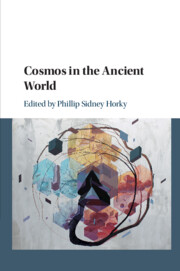
- Cited by 4
-
Cited byCrossref Citations
This Book has been cited by the following publications. This list is generated based on data provided by Crossref.
2020. Books Received 70.1. The Classical Review, Vol. 70, Issue. 1, p. 279.
Brémond, Mathilde 2021. Éléments et zones du monde d’Homère à Empédocle. Philosophie antique, p. 7.
Gagné, Renaud 2021. Cosmography and the Idea of Hyperborea in Ancient Greece.
Atkins, Christopher S. 2021. The Justice of the Cosmos: Philosophical Cosmology and Apocalyptic Eschatology in the Wisdom of Solomon. New Testament Studies, Vol. 67, Issue. 4, p. 598.
- Publisher:
- Cambridge University Press
- Online publication date:
- June 2019
- Print publication year:
- 2019
- Online ISBN:
- 9781108529082


